In a world increasingly reliant on technology, it’s no surprise that home security has gone digital. Gone are the days of relying solely on traditional alarm systems. 24/7 smart home security is rapidly becoming the new norm, offering a comprehensive and proactive approach to safeguarding your loved ones and belongings.
Imagine this: you’re on vacation, thousands of miles away, and a motion sensor is triggered in your living room. With 24/7 smart home security, you’re instantly alerted, can view live footage from your security cameras, and can even speak directly to whoever is in your home–all from your smartphone. This is the power of 24/7 smart home security, providing peace of mind whether you’re home or away.
This comprehensive guide will delve into the intricacies of 24/7 smart home security, exploring its benefits, key features, and top-rated systems available. Whether you’re a tech-savvy homeowner or just beginning to explore smart home solutions, this article will equip you with the knowledge to make informed decisions about protecting your haven.
Contents
- 1 24/7 Smart Home Security: Peace of Mind in a Connected World
- 2 Understanding the Basics of 24/7 Smart Home Security
- 3 Why 24/7 Smart Home Security Matters?
- 4 What You’ll Learn in this Guide?
- 5 Key Features of 24/7 Smart Home Security
- 6 Professional Monitoring: Your Eyes and Ears, Around the Clock
- 7 Smart Home Integration: Connecting Security with Convenience
- 8 Mobile Accessibility: Security at Your Fingertips
- 9 Exploring Popular 24/7 Smart Home Security Systems
- 10 Top-Rated Systems: Features and Comparisons
- 11 Factors to Consider When Choosing a System
- 12 Budget-Friendly Options for Comprehensive Protection
- 13 The Benefits of 24/7 Monitoring: Beyond Basic Security
- 14 Peace of Mind: Knowing Help Is Always Available
- 15 Deterrent to Crime: Proactive Security Measures
- 16 Remote Management and Control: Convenience and Efficiency
- 17 Installation Considerations: Getting Started with Smart Home Security
- 18 Professional Installation vs. DIY Options
- 19 Ensuring Seamless Integration with Existing Systems
- 20 Tips for Maximizing Your Security Investment
24/7 Smart Home Security: Peace of Mind in a Connected World
Unlike traditional security systems that simply sound an alarm when triggered, 24/7 smart home security systems offer a multi-layered approach to protection. These systems leverage a network of interconnected devices, sensors, and cameras, all working in sync to provide constant monitoring and control over your home’s security.
At the heart of 24/7 smart home security lies the concept of “always-on” protection. This means your home is constantly monitored for potential threats, whether it’s a break-in, fire, or environmental hazard. The system can detect unusual activity, send you instant alerts, and even take pre-programmed actions to mitigate risks.
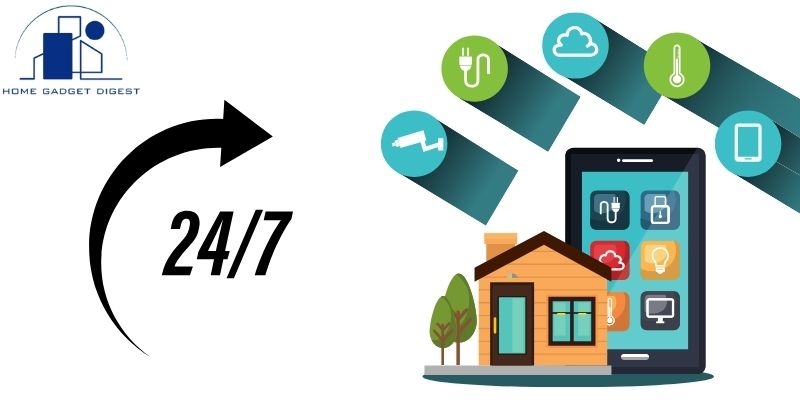
Understanding the Basics of 24/7 Smart Home Security
A typical 24/7 smart home security system consists of several key components:
- Control Panel: The central hub of the system, connecting all devices and managing communication with monitoring services.
- Sensors: Strategically placed throughout your home to detect motion, door/window openings, smoke, carbon monoxide, and more.
- Cameras: Provide live video feeds of your property, allowing you to monitor activity remotely. Many cameras offer features like night vision, motion detection, and two-way audio.
- Alarms: Audible sirens to deter intruders and alert you and your neighbors of potential threats.
- Monitoring Service: A professional team that receives alerts from your system and contacts emergency services when necessary.
These components work together seamlessly to create an invisible shield around your home, providing round-the-clock protection.
Why 24/7 Smart Home Security Matters?
In an era of rising crime rates and unpredictable events, the need for robust home security has never been greater. 24/7 smart home security offers several advantages:
- Enhanced Security: Continuous monitoring and instant alerts provide an extra layer of protection compared to traditional systems.
- Deterrent to Crime: The mere presence of a visible smart security system can deter potential burglars.
- Remote Access and Control: Manage your security system from anywhere, anytime, using your smartphone or computer.
- Peace of Mind: Know that your home is protected, even when you’re away, providing invaluable peace of mind.
What You’ll Learn in this Guide?
This comprehensive guide will delve deeper into the world of 24/7 smart home security, covering the following key aspects:
- Key Features: Explore the essential features of 24/7 smart home security systems and how they enhance your safety.
- Popular Systems: Discover some of the top-rated 24/7 smart home security systems on the market, comparing their features and benefits.
- Benefits of 24/7 Monitoring: Understand the value of professional monitoring and how it can elevate your home security.
- Installation Considerations: Learn about the different installation options, from DIY to professional installation.
By the end of this guide, you’ll be equipped with the knowledge to make informed decisions about investing in a 24/7 smart home security system that meets your specific needs.
Key Features of 24/7 Smart Home Security
To fully appreciate the capabilities of 24/7 smart home security, it’s essential to understand its key features and how they work together to create a comprehensive security ecosystem.
Professional Monitoring: Your Eyes and Ears, Around the Clock
One of the most significant advantages of 24/7 smart home security is the option for professional monitoring. This means that a dedicated team is always on standby, ready to respond to any alerts triggered by your system.
Here’s how it works: When your security system detects a potential problem, such as a break-in, fire, or medical emergency, it sends an instant alert to the monitoring center. Trained professionals then assess the situation and follow pre-determined protocols, which may include:
- Contacting you to verify the alarm.
- Dispatching emergency services to your location.
- Notifying designated contacts on your emergency list.
Professional monitoring ensures that you’re never alone in an emergency, even if you’re unable to respond personally.
Smart Home Integration: Connecting Security with Convenience
Modern 24/7 smart home security systems go beyond basic security by integrating seamlessly with other smart home devices and platforms. This interconnectedness opens up a world of possibilities, enhancing both security and convenience:
- Voice Control: Arm or disarm your security system, lock your doors, or even view live camera feeds using voice commands with Amazon Alexa or Google Assistant.
- Smart Lighting: Program your lights to turn on automatically when motion is detected, creating the illusion that someone is home and deterring potential intruders.
- Smart Locks: Control access to your home remotely, grant temporary access to guests, and receive notifications whenever your doors are locked or unlocked.
By integrating your security system with other smart home devices, you can automate tasks, create personalized security routines, and enjoy a truly connected living experience.
Mobile Accessibility: Security at Your Fingertips
In today’s mobile-first world, 24/7 smart home security systems empower you with complete control over your home’s security, right from your smartphone or tablet. Dedicated mobile apps provided by security providers offer a range of features, including:
- Remote Arming/Disarming: Easily arm or disarm your system from anywhere, ensuring your home is protected whether you’re out for a jog or on vacation.
- Real-Time Alerts: Receive instant notifications on your smartphone whenever an alarm is triggered, keeping you informed of any potential threats.
- Live Video Streaming: View live footage from your security cameras anytime, day or night, allowing you to check in on your home remotely.
- Two-Way Audio: Communicate directly with people in your home through your security cameras, whether it’s greeting a delivery person or deterring a potential intruder.
This mobile accessibility ensures that you’re always connected to your home’s security, no matter where life takes you.

Exploring Popular 24/7 Smart Home Security Systems
With a plethora of 24/7 smart home security systems available, choosing the right one for your needs can seem daunting. This section will explore some of the top-rated systems on the market, highlighting their features, pros, and cons to help you make an informed decision.
Top-Rated Systems: Features and Comparisons
- ADT: As one of the most recognized names in home security, ADT offers a wide range of 24/7 smart home security systems, from basic packages to comprehensive solutions with professional monitoring, home automation, and video surveillance. ADT systems are known for their reliability, professional installation, and 24/7 customer support.
- Vivint: Vivint stands out for its innovative technology and sleek, user-friendly equipment. Their systems typically include features like smart home integration, facial recognition cameras, and car monitoring capabilities. Vivint offers professional installation and 24/7 monitoring services.
- SimpliSafe: Known for its DIY-friendly approach, SimpliSafe offers customizable security systems that are easy to install and manage.
Their systems are wireless, contract-free, and offer optional professional monitoring.
- Ring Alarm: From the makers of the popular video doorbell, Ring Alarm offers affordable and user-friendly security systems that integrate seamlessly with other Ring devices. Their systems are DIY-friendly, offer optional professional monitoring, and are compatible with Amazon Alexa.
These are just a few examples of the many reputable 24/7 smart home security systems available. The best system for you will depend on your individual needs, budget, and desired features.
Factors to Consider When Choosing a System
When evaluating different 24/7 smart home security systems, keep the following factors in mind:
- Level of Protection: Determine the level of security you need based on your home’s location, size, and personal safety concerns.
- Professional Monitoring: Decide whether you want professional monitoring or prefer a self-monitored system.
- Home Automation: Consider whether you want to integrate your security system with other smart home devices.
- Mobile App Features: Compare the features and user-friendliness of the mobile apps offered by different providers.
- Installation Options: Decide whether you prefer DIY installation or professional installation.
- Pricing and Contracts: Compare pricing plans, contract lengths, and any hidden fees.
By carefully considering these factors, you can choose a 24/7 smart home security system that aligns with your specific requirements and provides optimal protection for your home and loved ones.
Budget-Friendly Options for Comprehensive Protection
While 24/7 smart home security systems offer advanced features and peace of mind, they can sometimes come with a hefty price tag. The good news is that there are now a number of budget-friendly options available that don’t compromise on essential security features. Here are a few tips for securing your home on a budget:
- Start Small and Expand: You don’t need to invest in a top-of-the-line system right away. Start with a basic package and gradually add components like sensors, cameras, and smart home integrations as your budget allows.
- Look for Contract-Free Options: Many security providers now offer contract-free plans, allowing you to pay for your services monthly and avoid long-term commitments.
- Consider DIY Installation: Opting for a system with DIY installation can save you hundreds of dollars in installation fees. Many modern systems are designed for easy installation, often requiring no drilling or wiring.
- Take Advantage of Discounts: Keep an eye out for promotional offers, discounts, and bundle deals offered by security providers, especially during peak seasons.
Remember, comprehensive home security doesn’t have to break the bank. By exploring budget-friendly options and making strategic choices, you can protect your home and loved ones without overspending.
The Benefits of 24/7 Monitoring: Beyond Basic Security
While the core function of 24/7 smart home security is to protect your property and loved ones from threats, the benefits extend far beyond basic security. Let’s explore some of the less obvious, yet equally significant advantages:
Peace of Mind: Knowing Help Is Always Available
In today’s fast-paced and often unpredictable world, peace of mind is priceless. 24/7 monitoring provides just that – the reassurance that help is always available, should the unexpected occur. Knowing that a team of trained professionals is constantly monitoring your home, ready to respond to any emergency, can alleviate stress and provide invaluable peace of mind, whether you’re home or away.
Imagine this: you’re on a business trip, and a severe storm hits your area, triggering a power outage in your home. With 24/7 monitoring, you’ll receive an instant alert, notifying you of the situation. You can then use your security system’s mobile app to check on your home, view live footage from your cameras, and even speak to a monitoring professional to assess the situation. This level of connectivity and support can provide significant peace of mind, knowing that your home is being looked after, even when you can’t be there.
Deterrent to Crime: Proactive Security Measures
The mere presence of a visible 24/7 smart home security system can act as a powerful deterrent to crime. Studies have shown that homes equipped with security systems are significantly less likely to be targeted by burglars.
The sight of security cameras, motion sensors, and alarm system decals sends a clear message to would-be intruders: this home is protected. This proactive approach to security can create a safer environment for you and your family, discouraging criminals from even attempting to target your property.
Moreover, many 24/7 smart home security systems offer features that enhance their deterrent capabilities. For instance, some systems allow you to activate a “vacation mode,” which randomly turns lights on and off, simulating occupancy and making it appear as though someone is home, even when you’re away. This can further discourage potential intruders.
Remote Management and Control: Convenience and Efficiency
24/7 smart home security systems empower you with unparalleled control over your home’s security, thanks to remote management capabilities. Through user-friendly mobile apps or web portals, you can manage virtually every aspect of your security system from anywhere, anytime. This remote accessibility offers numerous benefits:
- Arm/Disarm Your System Remotely: Forgot to arm your system before leaving for work? No problem! Simply use your mobile app to arm it remotely, ensuring your home is protected.
- Receive Real-Time Notifications: Stay informed about your home’s security with real-time notifications sent directly to your smartphone. Whether it’s a motion alert, a door opening, or an alarm trigger, you’ll know instantly what’s happening.
- Grant Temporary Access: Expecting a guest or a service provider while you’re away? Use your mobile app to grant them temporary access to your home, setting specific timeframes for entry and exit.
- Adjust System Settings: Need to make changes to your system’s settings, such as adding a new user or customizing alarm delays? You can do it all remotely through the app or web portal.
This level of remote management and control offers unparalleled convenience, allowing you to manage your home’s security with ease and efficiency.
Installation Considerations: Getting Started with Smart Home Security
Once you’ve chosen the perfect 24/7 smart home security system for your needs, the next step is installation. The installation process can vary depending on the complexity of the system and your own technical expertise. This section will explore the different installation options available, guiding you through the process of setting up your smart home security.
Professional Installation vs. DIY Options
When it comes to smart home security installation, you generally have two options: professional installation or a do-it-yourself (DIY) approach. Each option has its own set of pros and cons.
- Professional Installation: This is typically the recommended option, especially for more complex systems. Professional installers have the expertise to ensure that all components are properly installed, configured, and integrated with your home’s existing systems. This reduces the risk of errors and ensures that your system is up and running smoothly from the start.
- DIY Installation: Many modern smart home security systems are designed with DIY installation in mind. These systems often utilize wireless components, making installation as simple as connecting devices to your Wi-Fi network and placing sensors in strategic locations. DIY installation can save you money on installation fees and gives you greater control over the process.
The best option for you will depend on your comfort level with technology, the complexity of your chosen system, and your budget. If you’re unsure about DIY installation, it’s always best to err on the side of caution and opt for professional installation.
Ensuring Seamless Integration with Existing Systems
If your home already has existing security or smart home systems in place, you’ll need to ensure seamless integration with your new 24/7 smart home security system. This may involve:
- Compatibility Checks: Before purchasing a system, verify its compatibility with your existing devices, such as smart thermostats, lighting controls, and voice assistants.
- Hub Integration: Many smart home security systems utilize a central hub to connect and control different devices. Ensure that your existing devices can integrate with the chosen hub.
- Professional Consultation: If you have a complex home automation setup, consider consulting with a professional installer or home technology integrator to ensure smooth and seamless integration of your new security system.
By addressing these integration considerations upfront, you can avoid potential conflicts and create a truly interconnected smart home ecosystem.
Tips for Maximizing Your Security Investment
Congratulations on investing in a 24/7 smart home security system that provides an extra layer of safety and peace of mind. To further enhance your investment, consider these additional tips:
- Regularly Test Your System: It’s essential to regularly test your security system to ensure all components are functioning correctly. Most systems allow you to run test modes to check sensors, cameras, and alarm functionality.
- Keep Software Updated: Security providers often release software updates that improve system performance, add new features, and address security vulnerabilities. Regularly update your system’s software to ensure optimal performance.
- Secure Your Wi-Fi Network: Your smart home security system relies on a secure Wi-Fi connection. Protect your network with a strong password and consider enabling network encryption for added security.
- Maintain Your Devices: Dust or debris can accumulate on sensors and camera lenses, potentially affecting their performance. Regularly clean your devices and replace batteries as needed.
By following these tips, you can maximize the effectiveness of your 24/7 smart home security system, ensuring it continues to protect your home and loved ones for years to come.
As technology continues to advance, we can expect even more sophisticated and integrated smart home security solutions to emerge, further empowering homeowners with the tools and knowledge to protect what matters most.
Need Help Choosing the Right Tech for Your Home? Contact Us!
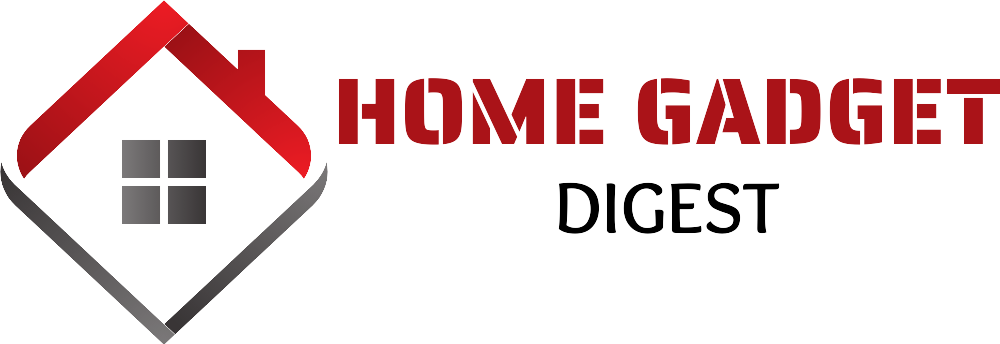




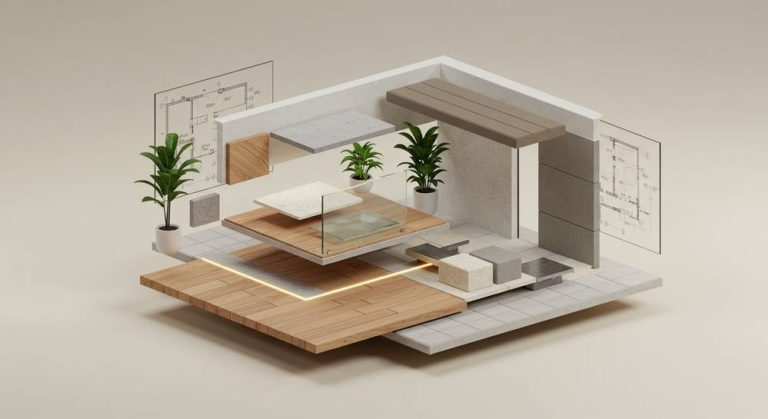
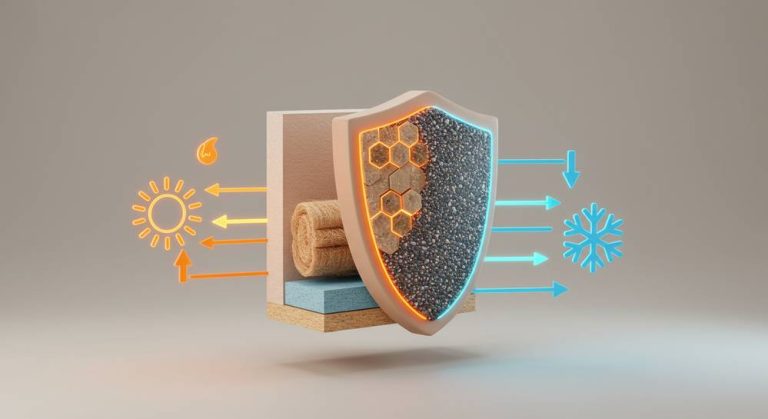






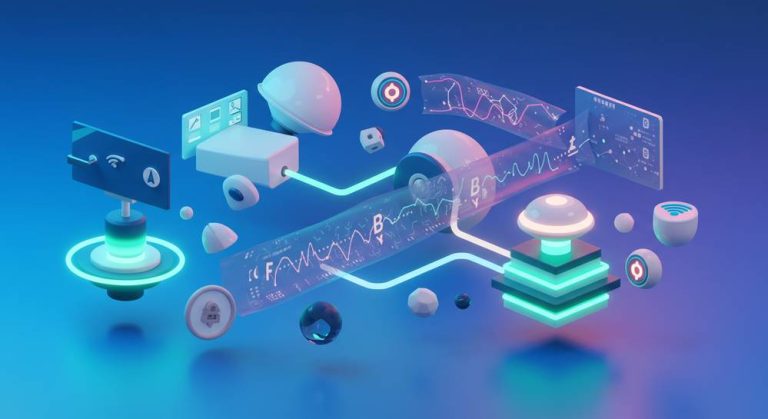
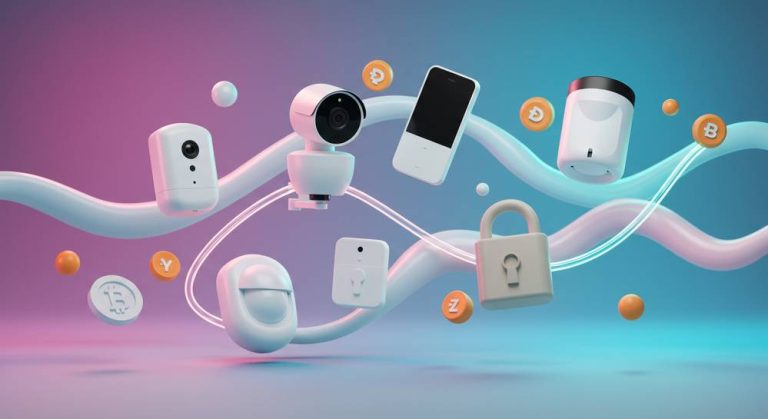


+ There are no comments
Add yours